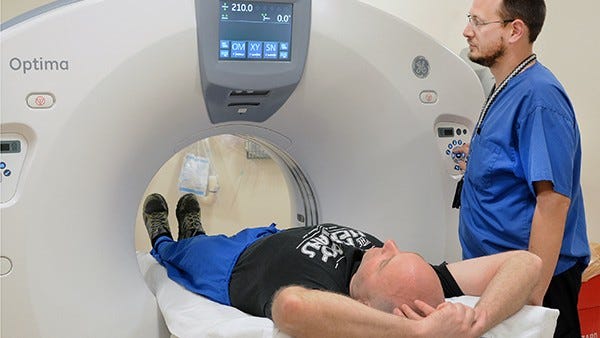
November is Lung Cancer Awareness Month and the Department of Veterans Affairs is participating in the second annual National Lung Cancer Screening Day on Nov. 11, which coincides with Veterans Day.
Lung cancer is the deadliest cancer among military veterans who have been diagnosed with cancer.
Dr. Chris Slatore, chief consultant, National Center for Lung Cancer Screening for the Veterans Health Administration, told CBS Eye on Veterans host Phil Briggs that lung cancer screening is critically important.
“In 2022, lung cancer took over 130,000 Americans from us and 8,000 veterans every year are served by the VA who have lung cancer. Those are just not numbers, those are real people.”
Slatore said undergoing a lung cancer screening is one of the best ways to reduce the chance of dying from lung cancer. VA uses a CAT scan to help find lung cancer when it is still early.
“At VA, we’re really ramping up what we’re doing to make sure every veteran eligible for lung cancer screening hears about it and can make a decision about whether or not it's the right choice for them,” he said.
The CAT scan allows lung cancer to be seen when it is very small and before it has had a chance to spread to other parts of the body, Slatore said.
“When we find them small, we can do treatments that are much more effective,” he said.
VA has actually turned Lung Cancer Screening Day into Lung Cancer Screening Week, Slatore said and is working with the White House’s MoonShot initiative, the American Cancer Society, the American College of Radiology and the Go2 Foundation to ensure veterans and all Americans learn more about lung cancer screenings.
Those eligible for lung cancer screening in both VA and non-VA settings are those who are 50 to 80 years old and have a history of past cigarette use or have quit within the past 15 years, Slatore said.
“It’s important that we screen those for lung cancer who are at a little bit more risk for lung cancer than the average person in order to maximize the benefit for lung cancer screening,” he explained.
Slatore added that vaping has not been around long enough to “have great evidence” about whether or not it causes cancer.
“We do know it causes other health problems, it definitely causes injuries to lungs,” he said. “There’s zero way it helps people not get cancer.”
Slatore said VA does not recommend lung cancer screening based on the use of an electronic vaping system, “but we’re doing a lot of research at VA to really figure out if those sorts of people and other sorts of people with other exposures might be eligible for a screening at VA in the future.”
To learn more about cancer care at VA, visit here. The American Cancer Society can be found here.
Reach Julia LeDoux at Julia@connectingvets.com.
